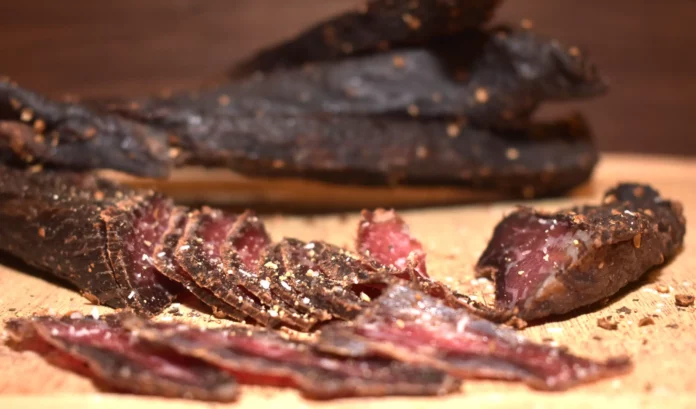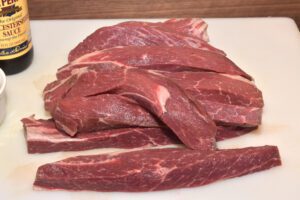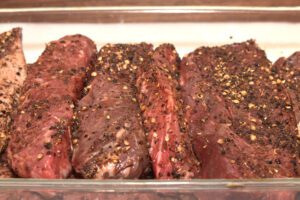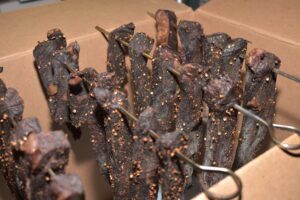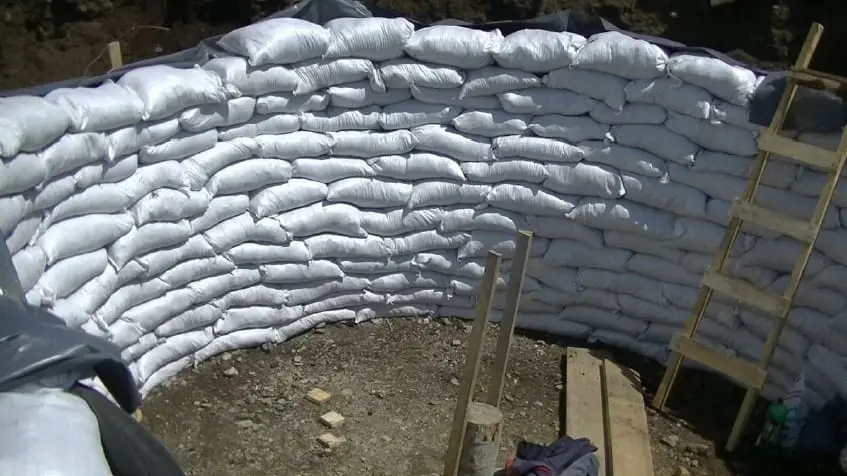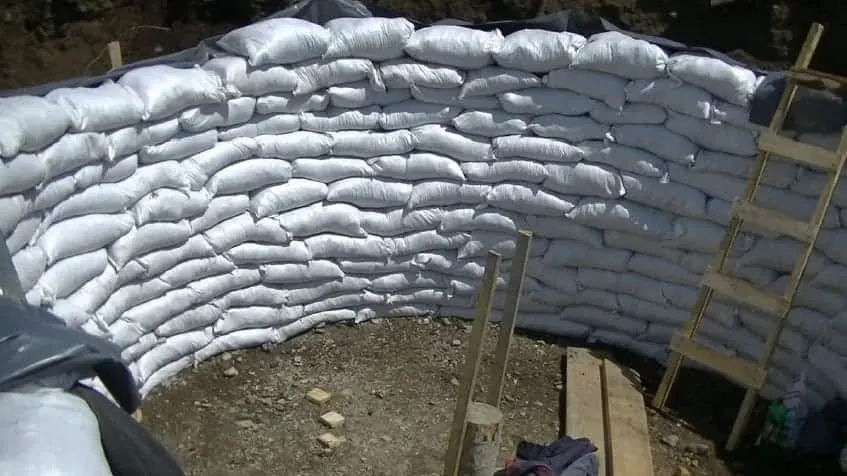SHTFPreparedness may collect a share of sales or other compensation from the links on this page.
Any means that you can use to extend the shelf life and utility of meat should be a part of your prepper food arsenal. Protein is expensive and required for a healthy diet. To add a complex twist, protein has a very short shelf life when left to its own devices. Besides, drying (jerking), canning, and salting, biltong is another tool in your preservation tool chest that is worth mastery. Give this ultimate biltong guide a read and I guarantee you will head right out and try it.
What is Biltong?
You’ve probably heard, or even made beef jerky. Biltong is its distant cousin. Starting as a lean cut of red meat, biltong ends as a spicy dried provision that can last a year.
Specifically, invented in South Africa, this was the preservation method that Europeans, during their explorations, would spend the winter making. The result would last through their summer explorations. Most importantly, the process of spicing and slow-drying of biltong is similar to curing meat. In contrast, we make jerky with an abundance of salt and dry it at high temperatures. In short, biltong is made in the shade, while jerky is made in the sun.
The result is a lightly spiced and relatively tough end product. In short, I would not recommend taking a bite out of a chunk of biltong like you would jerky. It’s best sliced so thin, that as my father would say, there’s meat on one side. These thin slices melt on your tongue!
Regardless of the difference, biltong is similar to jerky in that they extend the shelf life of red meat. While you won’t get decades of storage, you will get many months to a year with proper treatment.
How is Biltong Made
Biltong is the ultimate combination of meat, spice, salt, and time. As I stated, making biltong differs from jerky. The traditional jerky recipe uses salt, cuts the meat thin, and uses heat to drive moisture from the meat there by preserving it.
You make biltong with a quick bath in vinegar and spices, then dry it slowly in cool temperatures. The process is more like a cure applied to pork or beef. The slow process allows the little bit of and spices to permeate the meat and preserve it.
First, biltong starts as lean red meat cut in ½” to ¾” thick slices. Second, the pieces are then washed in vinegar, not soaked. Third, once wet, the slices are dusted with spices. The vinegar cleanses the surface while the spices keep down any nasties. While drying in the open air in South Africa, the spices kept off the flies while the vinegar killed any surface bacteria.
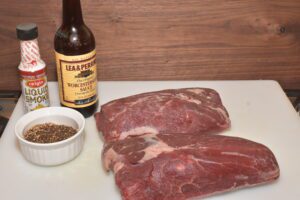

The main ingredients for biltong: beef roast, Worcestershire sauce, and spices
Next, after a pause of 12-24 hours, hang the pieces out to cure. A cool dry place with a little airflow is perfect for the process. You don’t want it to dry too quickly. Slow and steady is perfect. Specifically, you want to give it 5-7 days to dry.
Additionally, I prefer to use metal skewers, and stainless steel if you can get them. They are stiffer than wood and will holdup to the moisture and weight of thicker cuts.
- 🍖【PREMIUM STAINLESS STEEL, PERFECT WORKMANSHIP】Metal kabob skewers sticks are made of premium stainless steel,food grade, rust-proof, heat-resistant, and corrosion-resistant. These heavy duty grill skewers are corrosion resistant and can last long. The edges of the barbecue skewers are well polished, and the metal skewers are safe to use. Metal shish kabab skewer is of solid one-piece design. The bbq kebab sticks skewers are thick enough to allow you to add weight without bending or twisting.
- 🍖【HANDLE HOOK, FLAT BLADE AND WEDGE TIP DESIGN】All the shish kabob skewer blade is flat and wide. The flat barbecue sticks prevent the food being skewered from rotating or moving when flipping over shish kebab skewers on the grill. Stainless steel barbecue skewers can be fully rotated so that the food can be evenly heated and seasoned around. The slanted tips of these Kabob skewers can help you pile them up easily without breaking the food.
- 🍖【14” PERFECT LENGTH, EASY TO GRILL】The 14″ long kabob skewers fit various size grills. The stainless steel bbq sticks with perfect length which are able to hold significant chunks of food. Long barbecue skewers keep your hands away from heat source. Extended length of these grill skewers allows you to leave the handles stay out of grill lid. The kebab skewers handle won’t get hot and your hands won’t get burnt. The ergonomic handle is comfortable to hold and easy to use with food tong.
- 🍖【EASY CLEAN, REUSABLE】Unlike wood and bamboo sticks, stainless steel kabob skewers are reusable. The surface of the kebab skewers are smooth that grilled food residue won’t get stuck onto the kabob skewer blade. After each time’s use, just let these grilling skewers sit in warm water, hand wash with gentle detergent or threw them in dishwasher, wipe away water and keep in dry place, and they’ll come out as new. The metal shish kabab skewers can be can be reused, saving you money completely.
- 🍖【SATISFACTION, WORRY-FREE】Kabob skewers set includes total of 12 grill skewers works for shish kabob, shrimp, chicken, fruit, vegetable, meat, beef and more. All of the barbecue skewers come with tip covers for protection. A storage pouch keeps skewers well organized. For those who like to barbecue, this is an ideal gift. You can rest assured to use our kabob skewers set, if you have any reason for dissatisfaction, please feel free to contact us, We will send free replacement or full refund.
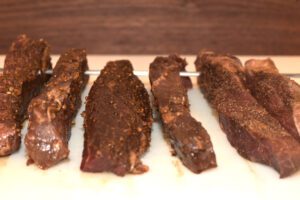

Top round after a day in spices and Worcestershire sauce, ready for the biltong box
Meat Selection
One of the best things about biltong is that it’s not the place for expensive cuts of meat. The end product should be lean and it will be tough. Feel free to make it out of sirloin, but your money is better spent elsewhere.
First, I buy the cheapest cuts I can find. These are usually top and bottom round roasts. When I have a deer in the freezer, I love to trim out the neck and use it for biltong. A tough cut is perfect as you will cut it extra thin to mitigate the texture.
Second, I save the well-marbled cuts for the grill and the stew pot. Fat turns rancid, so trim all of it off. Intermuscular fat is best avoided. This is where wild game excels. Venison, elk are perfect for biltong as they can be very lean.
Spices
Basically, spices protect the meat as well as add flavor. Consequencly, the traditional mix is roughly equal parts of salt, coriander, and pepper. Chiefly, you want enough to dust the meat, but there is no need to cover it completely. During the initial rest, the spices meld with the meat so no need to over spice. Additionally, if you wish, you can add another layer as you hang it up to dry.
I recommend starting with these spices to get the traditional feel and then expand in the direction of your preferred pallet. Indeed, I love to add garlic, hot peppers, even smoked paprika. Therefore, start small so that you preserve the nature of the meat and don’t overpower this pure taste. Next, try flavored salts. Finally, any dry spices will do! Experiment!
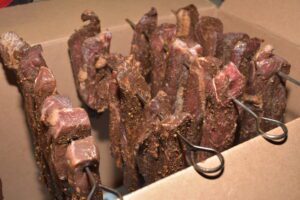

Strips of top round placed in the box for a week of drying
A friend recently gifted me a sizeable box of true South African biltong spices. On his last trip home to South Africa, he bought a king’s ransom of spices and sent more than a few my way. Without a doubt, they have made some of the best biltong I’ve ever had. Unfortunately, I haven’t had too much luck reverse engineering the spice mix enough to make my own. Consequently, I work with the traditional mix and add my own flavors.
- SOUTH AFRICAN SIGNATURE BLEND – Delight your taste buds with the rich, beefy flavors of South Africa with Crown National Safari biltong seasoning. A delicious spice seasoning specially blended with the freshest herbs and spices for that mouthwatering biltong-inspired beef jerky treat.
- FULL FLAVOR SEASONING SPICE – Love munching on beef jerky as snacks on the go? No worries. Simply mix this biltong seasoning to beef, pork, chicken, turkey, or venison, place on a food dehydrator to make jerky snacks in a few hours.
- HIGH PROTEIN SNACKS – Life can get busy. So, when hunger hits and you don’t have time to prepare a meal, healthy snacking is the way to go. High-protein snacks such as jerky are high in protein, an essential building blocks for muscles, bones, and skin
- SAVORY SPICE POWDER – Biltong seasoning has been a regular staple in many of South Africa’s kitchens–bringing families and friends closer together for decades. Salty with hints of coriander and pepper, and halal-friendly
- INSTRUCTIONS: use 40-50 g spice per Kg meat. Sprinkle the meat with vinegar, then sprinkle with seasoning. Lie on a tray for 2-4 hours, turning every 30 minutes. Hang to dry.
Curing Liquid
Curing liquid is a bit of a misnomer. Specifically, you aren’t doing a traditional long cure. In contrast, the process is more of a surface disinfectant.
Historically, the meat only needs a quick dip in vinegar. I normally use apple cider vinegar. Not much of the taste remains in the finished product, so your selection does not matter too much. This isn’t the place for artisan vinegars.
- BRAGG APPLE CIDER VINEGAR: The Bragg ACV Vinegar is made from organically grown apples, and offers various health benefits. To easily incorporate ACV into your diet, you can take a daily 2 oz shot, pour it over your salad, drink in a morning elixir with water and lemon, or add it to your hot tea.
- ORGANIC INGREDIENTS: The Bragg ACV is raw, unfiltered, and crafted from organically grown apples. It is USDA certified organic, Non-GMO Verified, and Kosher certified.
- MOTHER OF VINEGAR: The ‘Mother’ consists of strands of proteins, enzymes, and friendly bacteria that give the product its murky appearance. The ‘Mother’ is used for its natural cleansing qualities.
- APPLE CIDER VINEGAR HEALTH BENEFITS: Drinking a daily dose of Bragg Organic ACV offers many health benefits. ACV can help support a healthy immune system, aids in maintaining a healthy weight, delivers prebiotics, and helps you maintain normal glucose levels.
- The Bragg Difference: Our ingredients always come from the land, not a lab. It’s our vital difference. With Bragg Live Food Products Seal of Authenticity
The same friend from South Africa introduced me to Worcestershire sauce as the liquid. Comparatively, left to soak for 24 hours, the Worcestershire adds a very pleasant yet complex flavor. Further, to enhance this a bit, I add a few dashes of liquid smoke. I love smoked meats!
- Original Creators of Worcestershire Sauce Flavor
- Lea & Perrins uses only the finest ingredients sourced from around the world
- Perfect for those keeping kosher
- 20 fl.oz a total of 40 fl.oz.
Again, you don’t soak the meat in the liquid. A quick dip in a shallow dish covering all sides is sufficient.
- Country Of Origin: United States
- Model Number: 307421
- Item Package Dimension: 8.0699999917686″ L x 6.6099999932578″ W x 3.6599999962668″ H
- Item Package Weight: 2.3809924296 lb
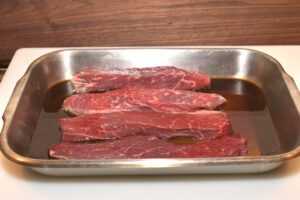

Coating beef strips in Worcestershire sauce
Biltong Box
While not completely necessary, a biltong box makes the curing process very convenient. Biltong boxes provide a dry environment with airflow. They can be as fancy as you wish, including a fan and low wattage light to create a little heat and draft.
I, on the other hand, have chosen the cheap route. In this case, an old Amazon box (we have no shortage of them), a spare computer fan from an old desktop, and a 5-volt power source make up my custom box.


An old computer fan powered by a 5 volt source provides just enough airflow for the biltong box
Again, a cool dry place with a little airflow is all you need. I normally make our batch in the basement during the dry winter months. A week in the box is perfect. If you are drying during the humid summer months, then a room dehydrator is a must. My buddy uses a dedicated dehydrator such as an Excalibur.
- Large Capacity: Equipped with 9 easy-to-clean Excalibur dehydrator trays, this large food dehydrator boasts 15 square feet of drying space
- Accurate Temperature Control: Features a built-in on/off switch and adjustable thermostat with a range of 105 to 165 degrees F – low enough for fruits and vegetables but high enough for dehydrating meat
- Low & Slow for Immune Boost: The perfect dehydrator for food and jerky, dried fruit leather, fruit roll-up puree, pet treats, homemade yogurt, veggies, nuts, and even bread, it cooks food at 115-118 degrees max, which preserves nutrients and enzymes
- Efficient & User Friendly: This meat and fruit dehydrator dehydrates food faster, retains more nutrients, and helps food look and taste better without tray rotation thanks to patented Excalibur Hyperwave technology and horizontal Parallex drying
- Includes: Digital download Guide to Dehydration, so you can quickly and easily learn how to dehydrate all types of foods; Made in the USA with USA- and globally sourced materials
For me, the Amazon old fan box works just fine as I want a slow drying process. Drying it too fast can cause case-hardening. The outside dries too fast, preventing the inside from drying. Slow and steady wins this race.
Using Biltong
We never seem to experiment with our biltong as it disappears too fast. To that end, it comes out of the package, gets sliced thin, then into the stomach. Not much room for experimentation there.
In summary, it’s spiced meat. Therefore, anything you can add meat to, as an accent, you can use biltong as an ingredient. to sum up, I recommend cooking it for a while, as in a soup or stew to soften it.
Perticularly, I enjoy it as an accent for savory meals. however, shaving off some with a rasp onto a salad or into a pot of grits or congee (rice porridge) adds a savory kick.
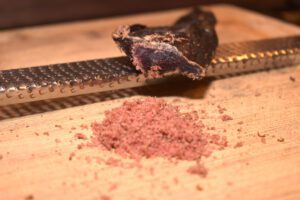

Biltong shaved with a microplane
Experimentation is fine, however I find that 99% of the time we eat it shaved thin as a side to a plate of cheese and crackers. Simple, for us, is best.
Biltong Recipe
Biltong has become a family favorite. Start with this recipe, then add garlic, dried peppers, etc. to suit your taste.
Title: Biltong
Author:
Yield: 1-2 pound of Biltong
Description: Beef Biltong
Prep Time: 10 minutes
Cook Time: 5-7 days
Additional Time: NA
Ingredients
3-5 pounds inexpensive beef roasts – topbottom round, London broil, or game meat
2 tablespoons kosher salt – or 1 tablespoon table salt
½ cup apple cider vinegar or Worcestershire sauce
2 teaspoons coarsely ground black pepper
2 tablespoons ground coriander
Other spices to taste – granulated garlic, redcayenne pepper, smoked chipotle powder, etc.
Instructions
- Combine the salt, pepper, and coriander
- Slice the beef or venison into ½” to ¾” slabs
A beef top round roast sliced 3/4 inch thick
- Dip the slices in a shallow pan of apple cider vinegar or Worcestershire sauce, coat all sides
- Generously coat each slice with the spice mixture, coat all sides
- Store the meat, sealed in a glass or other non-reactive container 12-24 hours
- Skewer each piece and let hang in a cool, dry place or in a biltong box
- After 3 days, test the pieces for doneness
- They should be stiff and hard, but not brittle
- You can cut open a piece to test it, if so, coat the cut end with vinegar and spices before hanging again
- Once they are done, remove from the biltong box
-
Biltong after a week in the box drying
- Vacuum seal into portions that you can eat in no more than 5 days
- Refrigerate the sealed bags
- Once opened, place in a paper bag or a plastic bag lined with paper towels you leave open
This is a starter recipe. Once you have it down, experiment, experiment, and oh yeah, experiment!
Storage Time and Conditions
Biltong is meant to be stored as the process extends the shelf life over raw, unprocessed meat. I recommend storing it in the best conditions possible (e.g., vacuum sealed and refrigerated) in order to get the most out of your effort.
How To Store Biltong
The shelf life of your meat will greatly depend on the conditions under which you store it. Left on the counter in a bag and you’ll be lucky to get two weeks. Leave that bag in the fridge and you may get 3-4 weeks. You’ll want longer than that.
I highly recommend putting the vacuum sealer to work. A few pieces vacuum packed up as an individual portion is the perfect size. We sometimes make our own bags to fit the pieces when we have time. This results in the least waste of the bags.
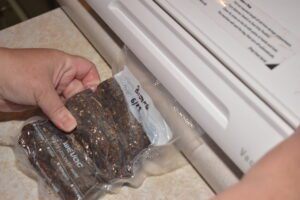

Vacuum packing several pieces of biltong – ready for a few months in the refrigerator
Once sealed in the bags, we toss them in the fridge. The cold temperatures are an added layer of protection. The time spent in the fridge also allows the moisture to equalize throughout the pieces. The moisture from the center softens the exterior. This makes for a slightly better product in my mind. It cuts easier and melts on the tongue a bit better.
Always use your senses when opening a bag of biltong. Look to see if there are any discolored or mold spots. If the spots are isolated, cut out that section of meat and discard. If the spots are widespread, then it’s time to toss it.
Next give the bag a smell. It should smell of meat and spices. If it smells off, then into the trash it goes. Finally, taste a small piece. Again, if it’s off, then send it to the trash.
How Long Does Biltong Store
I have seen no official documentation on the shelf life of biltong, therefore I rely on my senses and experience.
We spend the winter purchasing meat at sale prices and making up batches. The summer and fall are for reaping what we sew. Lunch fare at our off grid cabin is a simple plate of home-cured meat (cured pork, salami, and biltong) and cheese. Therefore, we are often eating it before the 6-month mark. We save a few packs to get us through the winter and spring.
This puts our max use at 12 months. Specifically, I have yet to experiment beyond this date. However, we have yet to lose a pack!
Wrapping Up Biltong
Curing and preserving meat is a must have skill in good times and in bad. For now, it enables you to stretch your dollar with cheaper cuts and making use of the off-cuts of game such as the neck.
In bad times protein will be a valuable resource. If the grid fails and the world leaves you with a thawing freezer of meat, a few spices and some vinegar can turn a potential total loss into months-long storage of this critical resource.
Give this recipe a try as you grow and improve your preservation skills.
Bonus: Root Cellar That Can Be Used as a Bunker
Do you remember the old root cellars our great-grandparents used to have? In fact, they probably built it themselves, right in their back yard.
If you want to learn how to build a backyard bunker like your grandparents had, without breaking the bank, then you need Easy Cellar.
Easy Cellar will show you:
- How to choose the ideal site
- Cost-effective building methods
- How to protect your bunker from nuclear blast and fallout
- How to conceal your bunker
- Affordable basic life support options
Easy Cellar will also reveal how a veteran, with only $421, built a small nuclear bunker in his backyard.


